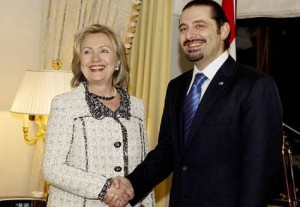 Lebanon is becoming the Berlin Wall of the new Cold War: the frightening, potentially nuclear proxy struggle between allies of the West and Iran.
Lebanon is becoming the Berlin Wall of the new Cold War: the frightening, potentially nuclear proxy struggle between allies of the West and Iran.
The West came to West Berlin’s short-term rescue with the 1948 airlift, but then could do little but stand and watch as the Soviet Union boxed Germany’s former capital into a corner for four decades.
Now Lebanon’s democratically elected government has had its legs taken away from under it by Hizbollah, Iran’s local front organisation. The country faces its own division, stand-off and stagnation, if not worse.
Like Berlin after the Second World War, Lebanon is a fractured place, with the major world powers – in this case, the US, Saudi Arabia and Iran/Syria – having their own local front men.
Saad Hariri, the prime minister, inherited the country’s largest fortune when his father, Rafiq, was murdered in 2005. His enemies were Syria and Hizbollah: both have been blamed. Hariri, a Sunni, made his fortune in Saudi Arabia which has backed him and then his son ever since. The Saudis, of course, loathe Iran.
Hariri’s not without support. He won the last election – though, rather like Northern Ireland, that only has the effect of rearranging the seats around the power-sharing cabinet table. He has majority support from Middle Eastern governments, including the big Gulf oil players. And, of course, he has America behind him.
Hizbollah made itself extremely popular after taking on Israel in 2006. But that popularity may have peaked – many Lebanese and others can see the danger of having a separate armed militia pursuing its own agenda. No-one wants a civil war, while if starts a conflict with Israel, it won’t exactly be taking a vote from the people who will be on the receiving end of Israeli air force strikes.
Scaremongers say that war would bring in Syria on its side – but does Syria, which has good self-preservatory instincts these days, really think that is a good idea?
And the United Nations tribunal which is the pretext for the latest row is said to have very good circumstantial evidence that Hizbollah played a key role in the 2005 killing, even if the evidence against individual members is likely to be less clear-cut. That would be a huge embarrassment for its growing regional credibility, which has depended on its being carefully ambiguous about exactly when it has been prepared to use terrorism to further its ends.
But a wounded Hizbollah is a dangerous tool in the hands of Iran, which is clearly desperate to distract domestic attention from sanctions, economic crisis and growing evidence that Israel and maybe the US have successfully sabotaged its uranium enrichment programme. The talk is constantly of a new confrontation with Israel, but a constant stand-off with America across the world is perhaps more likely.
If you consider that Iran’s allies include the likes of North Korea, you can see what that means: repeated, near-miss flare-ups, in Gaza one week, in Korea the next, a Beirut suburb next. Moqtada al-Sadr, the Shia militia leader who has just returned to Iraq full of fire and fury about getting rid of the Americans, is a fully-fledged Iranian loyalist now if he wasn’t always. Iran’s role in Afghanistan, and as host to al-Qaeda refugees, is as unpredictable as it is important.
Like the Cold War, these flare-ups do more damage to the West than you might think. They cause internal political strife, and they interfere with relationships such as with China – a quasi-ally of Iran and fully paid-up one of North Korea – that are vital to our economic well-being.
When the Berlin Wall fell, it was curtains for the Soviet Union, so that’s one bit of good news. But how long can we, and Lebanon, stay patient?

Leave a Reply
You must be logged in to post a comment.